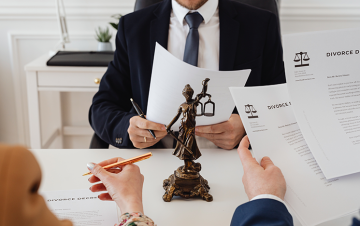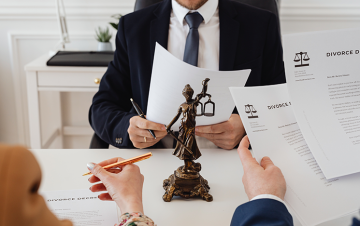Abuse of power or official position: legal support
"Abuse of official position" refers to situations where an official uses his position, rights or resources in the organization to achieve personal goals or to harm others. This may include corruption, use of public funds or property for personal enrichment, abuse of power, obstruction of justice, etc. Abuse of power or official position can have serious consequences for the organization and society as a whole, therefore it is important to combat these phenomena through appropriate control mechanisms, compliance with ethical norms and legal standards.
In such cases, a lawyer plays an important role - not only in providing qualified legal assistance, but also in forming a defense strategy that can significantly affect the outcome of the trial. After all, each case has its own characteristics that require an individual approach and high qualifications of a professional.
Legal stages in abuse of power
These stages help to correctly assess the situation, develop a defense strategy and ensure the legal protection of the client's rights:
- Research and analysis of the case: This is the first stage in which the lawyer analyzes the facts, laws and previous court decisions in order to understand the situation and determine the defense strategy or claim.
- Preparation of documents: A lawyer can prepare various documents, such as statements, petitions, agreements, contracts, etc., depending on the needs of the case.
- Negotiation: In some cases, before settling the case in court, lawyers may try to resolve the conflict through negotiations with the other party or its representatives.
- Representation in court: This is one of the most important stages for a lawyer, when he represents the interests of his client before the court, arguing his position and protecting the client's rights and interests.
- Appeal and cassation: If the case is not resolved at the first instance, or the court decision does not satisfy one of the parties, appeals or cassation appeals can be submitted to higher courts.
- Execution of the court decision: After the court has made a decision, there may be a need to execute this decision. A lawyer can assist a client in enforcing a judgment or protecting against wrongdoing when attempting to enforce a judgment.
Thorough completion of each stage of legal practice is critical to ensuring proper protection of the client's rights and achieving a fair resolution of the case under Article 364 of the Criminal Code of Ukraine. Involving a qualified lawyer at each stage helps to effectively resolve the dispute and minimize risks for the client.
Under what conditions can a lawyer's service for abuse of power be provided?
The provision of legal services is carried out under clearly defined conditions:
- Agreed price or payment: The customer may commit to pay a certain amount for the provision of the service, or the terms of payment may be determined otherwise.
- Agreed scope and nature of service: The contract or agreement may define the scope and nature of the service to be provided, their timing, limitations and other important aspects.
- Terms and conditions of service provision: The service may be provided under certain conditions and within certain terms specified in the contract or agreement.
- Compliance with the law and ethical standards: The service provider is usually required to act within the law and meet the ethical standards of their profession.
Fulfillment of the terms of the agreement allows not only to successfully provide legal services, but also guarantees compliance with all necessary ethical and legal norms.
Under what conditions can a lawyer's service for abuse of power not be provided?

Contradiction of the law: If the provision of the service violates the law or ethical norms governing the activity of the service provider.

Customer refusal or inability to cooperate: If the customer refuses the service or does not cooperate with the service provider, which makes it difficult or impossible to provide the service.

Inconsistency of terms: If the terms of service are not agreed between the parties or do not meet the requirements that they consider necessary.
How to independently understand issues of abuse of power?
These steps are especially important for those who want to resolve a legal issue on their own:
- Assess the situation: Carefully analyze all the facts and circumstances available to you that relate to your problem or question. Understanding the key aspects will help you better understand what's going on.
- Explore resources: Use available resources such as the Internet, books, articles, manuals, etc. to learn more about your problem or question. You can often find useful information that will help you understand the context and find answers to your questions.
- Consult with experts: If the matter is important or complex, it may be worth seeking help from experts in the relevant field. This could be a lawyer, financial advisor, doctor or other professional, depending on the nature of your problem.
- Consider alternative solutions: Think about different ways to solve your problem and weigh their advantages and disadvantages. Sometimes there are alternative ways that can be effective but unexpected.
- Make informed decisions: After you have evaluated all aspects of the situation and considered the various options, make an informed decision. It is important to consider all possible consequences and consequences of your choice.
Although independent analysis of the situation can be difficult, following the steps of assessing the facts, researching the law, and consulting with experts will help you better navigate the situation. This will make it possible to make an informed decision and determine a further strategy for resolving an issue related to abuse of power or official position.
Common questions about abuse of power or official position
Question
What is considered abuse of office?
Answer
Abuse of official position consists in the illegal or dishonest use of official authority, power or resources for the purpose of achieving personal benefit or causing harm to others. Thus, violation of Article 364 of abuse of official position.
Question
What are typical examples of abuse of office?
Answer
Typical examples include corruption (eg bribery, bribery, extortion, lobbying), misuse of public funds or property, abuse of power to persecute political opponents, interference with justice, violations of decision-making procedures, etc.
Question
What is the responsibility for abuse of official position?
Answer
Consequences may include criminal liability, loss of office, fines, disqualification from public office, deprivation of liberty, loss of reputation, etc.
What does the cost of a lawyer's services under Article 264 of the CCU depend on?
The price depends on several factors. These include, in particular, the complexity and scope of the case, the availability of additional evidence or testimony that may affect the defense strategy. In addition, the reputation of the lawyer, his experience in similar cases, as well as the need to involve additional specialists, such as experts or lawyers of a different profile, play an important role. The cost may also vary depending on the stage of the process (pre-trial investigation, trial) and potential difficulties in proving the fact of abuse.
ConclusionConsideration of a case under Article 364 of the Criminal Code of Ukraine requires a thorough approach at each stage, from studying the circumstances to executing the court decision. Thanks to clear terms of providing legal services and a systematic approach to independent analysis of the situation, everyone can understand how to act in situations of abuse of power or official position. Involving a professional will help ensure proper protection of the client's rights and achieve a successful outcome in the case.




































